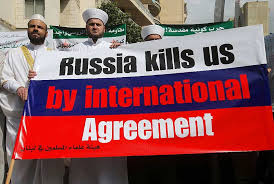March 2016
How was this decision made by Russia? Is it a
strategically important decision or a mere modus vivendi? The reason we raise
these questions is that Russia has announced it will maintain its two air and
naval bases in Syria. By keeping its boots in the Middle East bases does Russia
intend to continue its operations in Syria?
Reports and news on this matter all explain this
is a major decision. The method it was announced by the Kremlin, and a scene
where Russian President Vladimir Putin coincidently issued orders to his
foreign and defense ministers makes one realize the high importance and
seriousness of this matter. Maintaining the two air and naval bases will play
tactical roles and it appears they are aimed at lessening the blow of this
withdraw. This is entirely different from the role Russian air force played in
Syria.
Now we would like to see why Russia chose to
suddenly pull out its forces out of Syria.
Following the developments in Syria, we reach
this conclusion that Russia’s withdrawal was actually nothing unexpected. In my
opinion it wasn’t even unexpected for the regime in Iran. The media outlets of
both factions of “reformists” and “principlists” in Iran had been discussing
Russia’s unfaithful practices under various pretexts. For example, a website
associated to former Revolutionary Guards chief Mohsen Rezaie posted an
in-depth analysis to provide his own opinions through the words of “foreign
media outlets.” The Russians are seeking their own interests and have no
specific commitment to Hezbollah, he wrote. Of course, it is crystal clear that
by using the name Hezbollah, the former IRGC chief is actually referring to the
regime ruling Iran.
Why did Russia make such a decision? One Russian
official in describing this withdrawal of forces has said, “We did not enter
Syria to remain there forever.” International observers said Russia entered the
Syria spectrum seeking political and economic concessions, and if such
objectives were reached it will leave the turmoil stricken country of Syria.
However, the fact that this decision was made at such a turning point was first
and foremost due to the heroic perseverance seen from the Syrian people and
their freedom fighters, and of course the price they paid in the process of so
many hundreds of thousands perishing.
As a Russian official said in an interview with
the popular pan-Arabic Al Jazeera TV the Russians actually did not reach their
goals and instead came to this conclusion that the Assad regime is in its final
days. Remaining any further in Syria would cost Russia big.
Saudi Arabia, a major supporter of the Syrian
opposition, had frankly informed Russia of its intention to provide anti-air
weaponry to opposition forces, which would of course significantly tilt the
balance of power against Moscow’s interests.
United Nations Special Envoy to Syria Staffan de
Mistura had specifically warned if the negotiations in Geneva fail “Plan B”
will fall into effect and Russia will find itself in a major showdown against
the United Nations and Arab states. Other analysts and experts have cited the
falling price of oil as an effective element. All these factors most definitely
played a major role in the Kremlin’s turning point decision.
The question is why is the Iranian regime so
terrified of such a development? I believe the answer is very clear: Russia
departing from Syria means Iran and its proxy forces will be left on their own
and the very powerful factors that forced Russia to leave will be focused
completely on the Iran camp in Syria. Rest assured Iran’s strength in Syria is
nothing comparable to that of Russia.
This leaves Iran and its proxies facing a
difficult decision to either leave Syria, leading to the complete fall of this
regime’s strategic depth; whereas deciding to remain in Syria would spell the
end of Assad and Iranian regime together in the not so distant future.

No comments:
Post a Comment